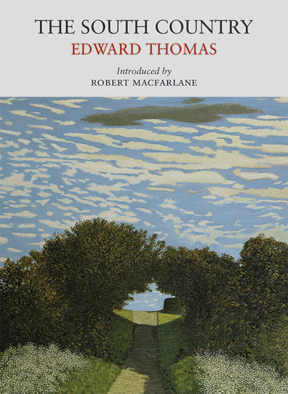This looks interesting.
Radio 3, Sunday, March 28th at 10.45pm.
Inspired by the recent republication of Edward Thomas’s essay collection The South Country, the weekly sequence of music, poetry and prose celebrates the landscape of southern England, in particular three counties in which the poet loved to walk: Sussex, Hampshire and Wiltshire.
Tamsin Greig and Neil Pearson read prose by fellow observer-wanderers Gilbert White, William Cobbett and Richard Jefferies, and poetry by such lovers of the south as Flora Thompson, Andrew Young, Hilaire Belloc, Molly Holden and, of course, Edward Thomas himself. The music includes orchestral music and songs by John Ireland, Michael Tippett, The Copper Family and the English Acoustic Collective among others.
Programme producer Lindsay Kemp;
It was the recent republication of Edward Thomas’s collection of prose essays The South Country that gave me the idea for this edition of Words and Music. I had already included poems by Thomas in previous programmes, and felt the power of his clear-eyed and unsentimental descriptions of landscape, nature and weather grow on me with each one. Though born in London of Welsh descent, Thomas lived for much of his adult life in Hampshire, and the atmosphere of the southern woods and hills in which he loved to walk is conveyed with as strong a sense of place as you will find in any writer’s work.
Thomas took the title of his collection from that of a poem in praise of the Sussex Downs by Hilaire Belloc, but himself extends the description to encompass ‘all that country which is dominated by the Downs or by the English Channel’. Emboldened, perhaps, by my own knowledge and love for this part of the world (more of this anon), I took it upon myself to make a further redefinition, so that for the purposes of this programme the South Country consists of the central-southern counties of Hampshire, Sussex and Wiltshire.
Thomas makes three appearances, not in extracts from The South Country but in a death-haunted vision of a deep-sided valley, and in two poems celebrating timeless south-country characters. Belloc’s poem, anticipating a return to his beloved Sussex, is also there; and I was delighted to find one expressing similar feelings for Hampshire by Flora Thompson, who, although best-known for her descriptions of Oxfordshire village life in the Lark Rise trilogy, lived for many years in the county, working as a postmistress. Another famous Hampshire resident was Jane Austen, and the sight of the Channel at Spithead in particular must have made a special impression, for it drew from her a rare, brief landscape description in Mansfield Park.
Elsewhere there are lyrical evocations by Siegfried Sassoon, Francis William Bourdillon and Andrew Young (a Scotsman who came to love the south of England!), a brisk ‘run of the downs’ by Rudyard Kipling, and prose paeans by those astute 18th-century observer-roamers Gilbert White and William Cobbett, and their Victorian counterpart Richard Jefferies. To end, there is a perfect funeral poem for all southern folk by Molly Holden.
The music is often less specific in its subject-matter, but includes pieces by a spread of English composers who loved the landscape of the south, from John Ireland to Gustav Holst and Hubert Parry to Michael Tippett. There are also earthier contributions from folksingers Shirley Collins, Tom Willett, and Bob and Ron Copper, and a lilting recreation of a train-ride from Salisbury to London from the English Acoustic Collective.
Earlier I mentioned my own love of the South Country. I was born and grew up in north-east Hampshire, where Thomas, White, Cobbett and Austen were familiar local heroes (I remember the delight with which, visiting The White Horse pub once near Steep, I learnt that this was where he liked to drink, and that it was the subject of one of his very first poems). Coming from near Aldershot, I recognise too the ‘fighter-squadron’s drone’ mentioned by Sassoon in ‘On Scratchbury Camp’; and, for good measure, I remember singing ‘I love my love’, the folk-tune which opens the programme in Holst’s arrangement, in my school choir. I knew, therefore, that this edition of Words and Music would strike a personal note for me, but even I was not prepared for the powerful nostalgic and emotional pull hearing Tamsin Greig and Neil Pearson read these poems and prose extracts would exert. Thomas’s widow Helen wrote how, after her husband had joined up in 1915 and been sent to France, he would remember the South Country from his dugout, mapping out in his mind the places where he had walked, knowing perhaps that he would never see them again (he was killed at the Battle of Arras in 1917). Today I find myself living in rather less dangerous circumstances, and with only London, not the sea, separating me from my southern ‘home’; but, like Thomas’s, my visions and remembrances of clear downs, chalky beech-hangers and hollow lanes refuse to leave me.
buy the book (with an introduction by Robert MacFarlane) from the Caught by the River shop.
